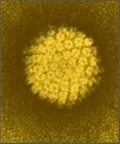AT THE 2016 ASCO ANNUAL MEETING
CHICAGO (FRONTLINE MEDICAL NEWS) – The antibody drug conjugate rovalpituzumab tesirine (Rova-T) is active in DLL3-expressing recurrent and refractory small–cell lung cancer, according to results of a small, first-in-human trial.
Nearly a fifth of the 60 evaluable patients studied experienced tumor shrinkage, and 41% achieved clinical benefit, lead author Dr. Charles M. Rudin of Memorial Sloan Kettering Cancer Center, New York, reported at the annual meeting of the American Society of Clinical Oncology.
“We have demonstrated activity in recurrent and refractory small–cell lung cancer and comparable responses in the second- and third-line settings,” he summarized. “Responses and survival numerically improve [upon] historical controls.”
“This was an early but interesting study of a novel antibody drug conjugate demonstrating activity in progressive small–cell lung cancer which is a very aggressive disease with limited treatment options,” commented moderator Dr. Smitha Krishnamurthi of University Hospitals Case Medical Center, Cleveland.
“What we were focusing on was a new target in small–cell lung cancer, which we believe may be a predictive biomarker for therapeutics. DLL3 is expressed in many small–cell lung cancers and is not expressed in any normal adult tissue,” Dr. Rudin explained. Rova-T contains an anti-DLL3 antibody and pyrrolobenzodiazepine, which together selectively kill DLL3-expressing cells. The study focused on safety and efficacy.
Of the 74 patients enrolled in the study, 60 had tumor tissue samples and were selected for further study. DLL3 was detected in 88% of the patients, and 67% had high-level expression, which was defined as having measurable DLL3 in at least 50% of cells.
All patients received Rova-T as a first-, second-, or third-line therapy. Eleven out of the 60 patients experienced tumor shrinkage and 68% achieved clinical benefit. Among the high–DLL3-expressing patients, 89% achieved and maintained stable disease for at least two scans taken every 6 weeks.
Among the 26 patients with the highest levels of DLL3, 39% responded to the drug, while 32% achieved 1-year survival.
The 12 patients who received Rova-T as a third-line therapy responded “particularly well, with 50% having tumor shrinkage,” reported Dr. Rudin.
“Most importantly, this is the first biomarker-directed therapy to be defined for the treatment of small–cell lung cancer, and this is a biomarker that is expressed in a large majority of small–cell lung cancers so a biomarker that may [have] utility for small–cell lung cancer. Small–cell lung cancer is a terrible disease and is really unchanged in clinically meaningful endpoints for patients. … Median survival [is] 9-10 months from time of diagnosis, and for recurrent disease, there is really one approved drug … so a lot of room for improvement here,” Dr. Rudin said. Although based on a small cohort, Dr. Rudin noted, “these data really look promising to us as a novel therapeutic for small–cell lung cancer.”
“These results clearly justify further clinical development. We are currently enrolling to those studies,” he said referring to TRINITY, a third-line, single-arm study with no comparative drug. TRINITY is currently enrolling patients in multiple centers. There are also several other trials in the works to look at other diseases with DLL3 expression and to assess Rova-T’s efficacy and safety in combination with other drugs.
Dr. Rudin disclosed that he has a consulting or advisory role with AbbVie, AVEO, Boehringer Ingelheim, GlaxoSmithKline, Merck, Celgene, Novartis, and has received funding from Biomarin. This study was funded by Stemcentrx.



